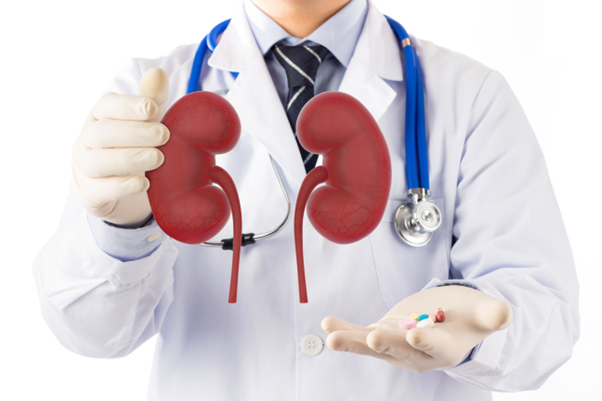Kidney tumours are abnormal growths that develop in the kidneys, which are vital organs responsible for filtering waste, regulating fluids, and producing urine. When these growths occur, they can be benign (non-cancerous) or malignant (cancerous). While most kidney tumours in adults are malignant, not all kidney growths are cancerous. Recognizing the symptoms early can make a huge difference in managing the condition effectively.
What Are Kidney Tumours?
Kidney tumours are growths or masses that develop within the kidney tissue. The kidneys, which are located on either side of the spine in your lower back, play an essential role in filtering waste from your blood. Kidney tumours can occur when abnormal cells in the kidney begin to grow uncontrollably. These tumours can either be:
- Benign (Non-Cancerous): These are growths that do not spread to other parts of the body. They can cause symptoms but typically do not pose a life-threatening risk. Examples include renal adenomas and angiomyolipomas.
- Malignant (Cancerous): Kidney cancer, or renal cell carcinoma (RCC), is the most common type of kidney cancer in adults. It starts in the kidney's filtering tubes and can spread to other parts of the body if left untreated.
Signs and Symptoms of Kidney Tumours
In the early stages, kidney tumours may not cause noticeable symptoms. However, as the tumour grows, it may cause the following:
- Blood in Urine (Hematuria): One of the most common signs of kidney tumours. You may notice bright red or dark brown urine, or it might only be visible under a microscope.
- Pain or Discomfort in the Side or Back: This can feel like a dull ache or sharp pain in your back or sides, particularly in the area of the kidneys.
- Fatigue and Weight Loss: Kidney cancer can cause unusual tiredness and unexplained weight loss as the disease progresses.
- Swelling in the Legs or Abdomen: Tumors may cause fluid buildup, leading to swelling.
- Fever or Night Sweats: Unexplained fever or sweating, especially at night, can also be signs of a kidney tumour.
- Loss of Appetite: A general lack of interest in food is common with various types of cancers, including kidney cancer.
If you notice any of these symptoms, it's essential to consult with a healthcare provider to determine their cause.
Risk Factors for Kidney Tumours
While the exact cause of kidney tumours is not always known, there are several factors that can increase the risk of developing a kidney tumour, especially kidney cancer. These include:
- Age: Kidney tumours are more common in people over 50 years old. The risk increases with age.
- Gender: Men are more likely to develop kidney cancer than women.
- Smoking: Smoking significantly increases the risk of developing kidney cancer. The chemicals in tobacco can damage the kidneys over time.
- Obesity: Being overweight or obese is linked to a higher risk of kidney cancer due to hormonal changes or insulin resistance.
- High Blood Pressure: People with high blood pressure have a higher likelihood of developing kidney tumours.
- Family History: If someone in your family has had kidney cancer or related genetic conditions, your risk is increased.
- Chemical Exposure: Working with certain chemicals, like asbestos or cadmium, may raise your risk of kidney tumours.
How Are Kidney Tumours Diagnosed?
If your doctor suspects you may have a kidney tumour, they will begin with a physical exam. The following diagnostic tests may be used:
- Imaging Tests: Ultrasounds, CT scans, or MRIs can provide detailed images of the kidneys, showing the size and location of any tumours. These scans also help determine whether the tumour has spread to other areas.
- Urine Tests: A urine sample may be analyzed to check for blood, unusual cells, or other signs of kidney problems.
- Blood Tests: Blood tests may be conducted to check for kidney function and assess your overall health.
- Biopsy: In some cases, a biopsy is necessary. This involves removing a small tumour sample for examination to determine if it's benign or malignant.
Treatment for Kidney Tumours
Treatment options for kidney tumours depend on whether the tumour is benign or malignant, how large it is, and if it has spread. Some common treatments include:
- Surgery:
- Partial Nephrectomy: If the tumour is confined to one part of the kidney, the doctor may recommend partial nephrectomy. This procedure involves removing only the tumour and a small portion of surrounding tissue.
- Radical Nephrectomy: If the tumour is large or cancerous, the doctor may suggest removing the entire kidney, along with surrounding tissues or lymph nodes, to ensure all cancer cells are removed.
- Ablation Therapy: This is an option for smaller tumours or when surgery isn't an option. Ablation therapies like cryoablation (freezing the tumour) or radiofrequency ablation (heating the tumour) can destroy cancer cells.
- Targeted Therapy: Targeted therapy involves medications that specifically target cancer cells and block their growth. These therapies are often used for advanced kidney cancer.
- Immunotherapy: This treatment uses the body's immune system to help fight cancer. It may be used in advanced kidney cancer, particularly when it has spread.
- Chemotherapy and Radiation: Chemotherapy is rarely used for kidney cancer but may be considered in some cases. Radiation therapy can help shrink tumours or relieve pain in advanced stages.
- Observation: For benign tumours that are small and not causing any symptoms, your doctor may suggest regular monitoring instead of immediate treatment.
Prognosis and Survival Rate
The outlook for kidney tumours depends on several factors, including how early the tumor is detected, the size of the tumour, and whether it has spread. Early-stage kidney tumours have a much better prognosis. For kidney cancer that has not spread, the five-year survival rate is about 93%. However, the survival rate decreases when the cancer has metastasized.
While kidney tumours can be a serious health concern, early detection and treatment can greatly improve the chances of successful treatment and recovery. If you experience symptoms such as blood in the urine, back pain, or unexplained weight loss, don't hesitate to see a healthcare provider. Early diagnosis is key to effective treatment, especially if you are at increased risk due to factors such as age, smoking, or family history.
Don't wait for symptoms to worsen! Book a consultation today for a thorough check-up and early detection. Protect your kidneys and your health—take charge now!



